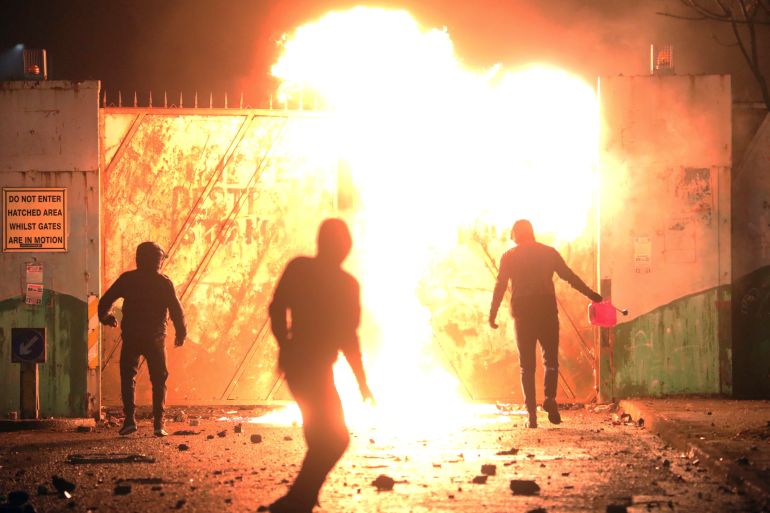Irish PM warns against ‘spiral’ in Northern Ireland violence
Micheal Martin issues warning after 14 police officers injured in another night of clashes in Northern Ireland.

The Irish prime minister, Micheal Martin, warned against a “spiral back” into sectarian conflict in Northern Ireland on Saturday, after a week-long streak of unrest continued with 14 police injured in the latest night of clashes.
Disorder sparked in pockets of Belfast – the capital of Northern Ireland – on Friday night with petrol bombs and masonry thrown at officers, the Police Service of Northern Ireland (PSNI) said.
Keep reading
list of 4 itemsNorthern Ireland police appeal for calm after more unrest
Simon Coveney: Is Ireland an emerging Celtic Tiger of diplomacy?
Brexit tensions: Northern Ireland port staff face intimidation
A car was also “hijacked and set on fire and pushed towards police lines”, as the total number of officers injured in the recent disorder reached 88.
Elsewhere, police clashed with a crowd of 40 in the northern town of Coleraine and a man was charged with “possessing petrol bombs in suspicious circumstances” following disorder in Newtownabbey, a suburb north of Belfast.
Saturday marks the 23rd anniversary of the 1998 Good Friday Agreement, which wound down the three-decades-long conflict over British rule in Northern Ireland which killed more than 3,600 people.
“We owe it to the agreement generation and indeed future generations not to spiral back to that dark place of sectarian murders and political discord,” Martin said in a statement.
“There is now a particular onus on those of us who currently hold the responsibility of political leadership to step forward and play our part and ensure that this cannot happen.”
Irish foreign minister Simon Coveney said it “has been a difficult and worrying week”.
“This anniversary comes as a reminder of the responsibilities we all have, as well as what politics, determination and dialogue can achieve,” he said.
“That is the spirit we need now.”
“It is incumbent on all of us to support Northern Ireland in leaving its divisive past behind,” said Britain’s Northern Ireland Secretary, Brandon Lewis.
The most bitter unrest in recent years has mainly emanated from the pro-United Kingdom unionist community.
Resentment is simmering in some quarters over apparent economic dislocation due to Brexit and existing tensions with pro-Irish nationalist communities.
After the UK left the EU at the start of this year, checks and tariffs were introduced on some goods moving from mainland Britain to Northern Ireland as the province now borders the bloc via EU member the Republic of Ireland.
But critics of the departure deal’s Northern Ireland Protocol say a border is now in effect in the Irish Sea, leaving unionists, who want to stay in the UK, feeling betrayed.
Brigid Laffan, director of the Robert Schuman Centre for Advanced Studies at the European University Institute, told Al Jazeera that the protocol has undermined the loyalist sense that “London will take care of them”.
“So unionists and loyalists feel more vulnerable now, and this then comes on top of a lot of socioeconomic problems in loyalist areas,” she said.
“So what we are seeing in Northern Ireland today is very dangerous.”
The violence has also spread into the nationalist community. On Thursday night, nationalist rioters hurled petrol bombs, fireworks, bricks and bottles at ranks of armoured police vehicles preventing their advance to a unionist enclave.
Officers deployed a water cannon for the first time in years and drove back the surging crowds late into the night.
The previous evening, the gates in a “peace wall” separating unionist and nationalist neighbourhoods were set alight.
Police said crowds from either side broke through to attack each other with petrol bombs, missiles and fireworks.
On Friday marches had been planned in unionist communities in Belfast but they were cancelled following the news that Prince Philip – the husband of Queen Elizabeth II – had died.
“Protests are postponed as a mark of respect to the Queen and the Royal Family,” a hastily erected placard in one unionist neighbourhood announced.
While rioting on Friday was less pronounced than earlier in the week, there are fears it may gain new momentum in the coming days.
“I’m worried about the weekend ahead,” Michelle O’Neill, Northern Ireland’s deputy first minister and leader of nationalist party Sinn Fein, told reporters on Friday.